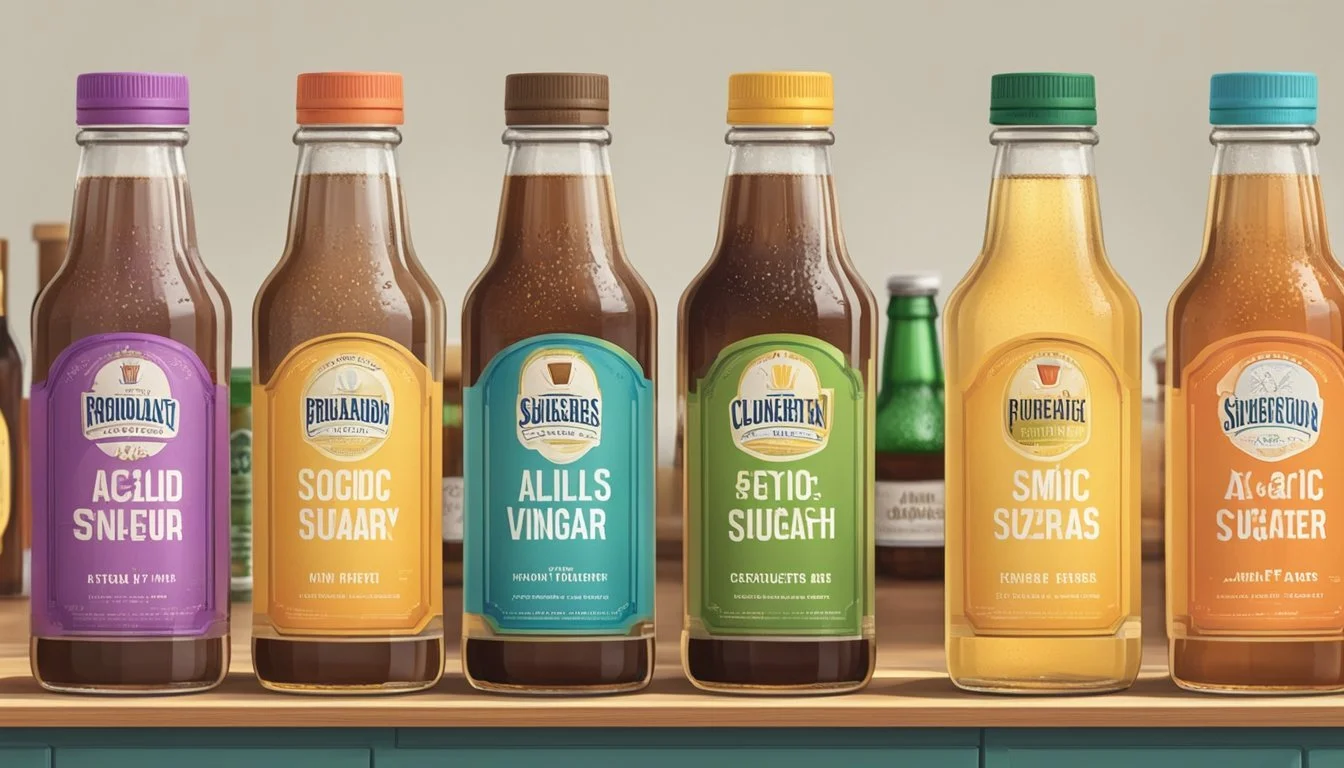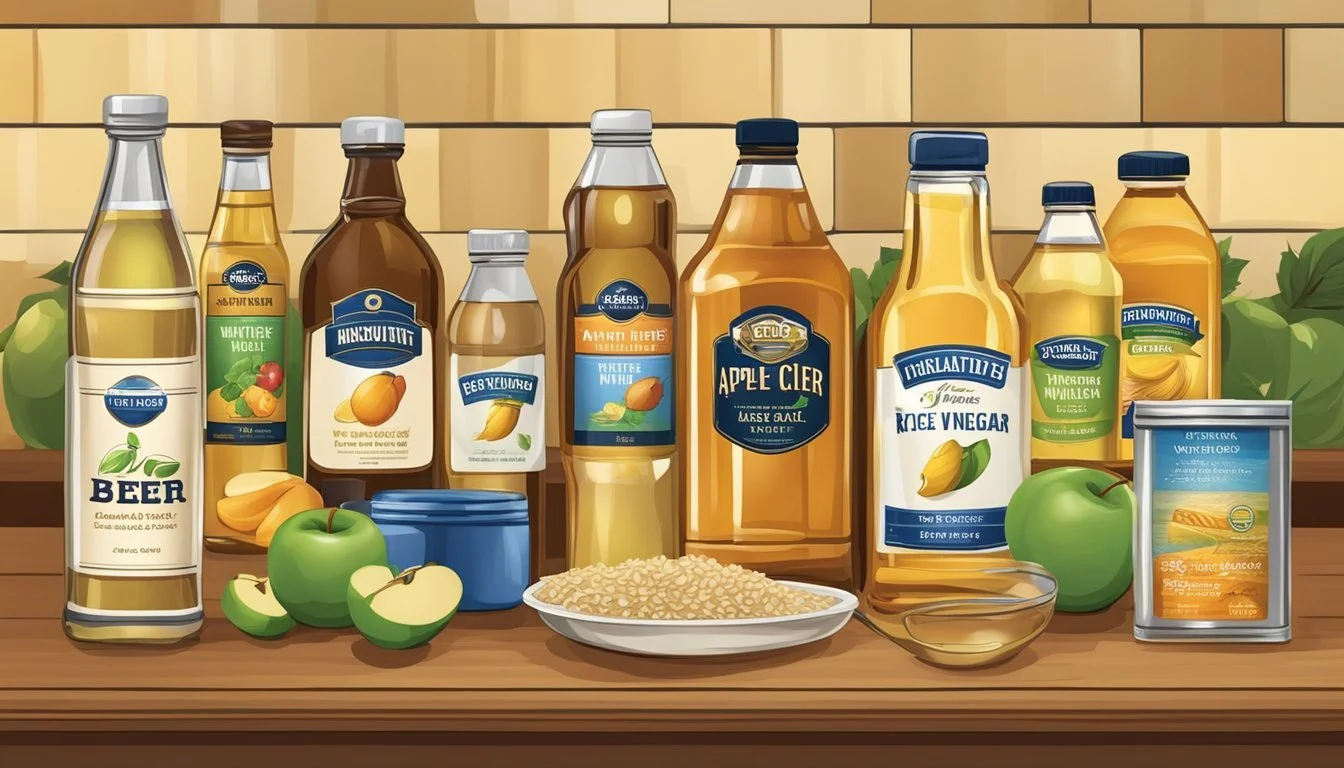Beer Vinegar Substitutes
Top Alternatives for Your Recipes
Beer vinegar, with its unique combination of maltiness and acidity, is a flavorful ingredient often used in culinary applications ranging from salad dressings to marinades. Its distinct taste, derived from fermented grains and the presence of hops, can enhance the profile of a dish, imbuing it with a slight bitterness and a complex flavor. While beer vinegar may not be a staple in every kitchen, understanding suitable substitutes can help maintain the integrity of a recipe when it is unavailable.
Substitutes for beer vinegar in cooking need to fulfill a dual role: they should offer a compatible flavor profile while also delivering the requisite acidity to the dish. Apple cider vinegar, a common kitchen staple, presents a mild sweetness similar to beer vinegar and can be used in a one-to-one substitution ratio. For recipes that call for the sharp tang of beer vinegar, a combination of white vinegar and water can replicate its potency, albeit without the malt undertones.
In recipes where the depth of flavor associated with beer vinegar is essential, sherry vinegar can be an effective substitute, bringing a similar complexity to dishes. Ingredients like malt vinegar and balsamic vinegar, though distinct in their own right, may also serve as substitutes, provided that their unique flavor notes are complementary to the other components of the recipe. When substituting for beer vinegar, it is important to consider the overall balance of flavors in the dish to achieve a harmonious end result.
Understanding Beer Vinegar
Beer vinegar is a culinary ingredient valued for its unique combination of malted barley essence and a tangy acidic bite. Its flavor and acidity lend distinct characteristics to various dishes.
Acidity and Flavor Profile
Beer vinegar derives its acidity from the fermentation process, where alcohol is transformed into acetic acid. This process imparts a sharp tartness, which is a key component in its flavor profile. It typically has a milder acidity than white or wine vinegars, hovering around 5-7% acetic acid. The flavor of beer vinegar is complex, often described as malty, with hints of the original beer's hoppy and yeasty notes.
Acetic Acid Content: 5-7%
Flavor Notes: Malt, Hops, Yeast
Culinary Uses of Beer Vinegar
In the kitchen, beer vinegar is known for its versatility. It can enhance a marinade, adding both tenderizing acidity and robust flavor to meats and vegetables. Also, it's a popular choice for enlivening beer batters used in frying, giving an extra layer of flavor reminiscent of the beer itself.
Here are some typical applications:
Marinades: Adds depth and helps tenderize proteins
Salad Dressings: Offers a beer-inflected twist
Pickling: Brings a malty undertone to pickled vegetables
Deglazing: Introduces complex flavors to pan sauces
Its distinctive taste and alcoholic heritage make beer vinegar a multi-functional ingredient that can elevate the taste of a dish, broadening the flavor dimensions of cooking.
Substitution Basics
Choosing an alternative for beer vinegar in recipes involves understanding the role it plays in the dish to maintain the intended taste profile.
Factors To Consider When Choosing Substitutes
Flavor: Beer vinegar imparts a unique taste that combines the slight bitterness of hops with malty sweetness. Substitutes should offer a similar balance.
Acidity: The acidity in beer vinegar is crucial for certain recipes, especially in pickling or sauces. Alternatives need to provide comparable tanginess.
Alcohol Content: Although most of the alcohol evaporates during cooking, it is a consideration for non-alcoholic options.
Flavor Match: The substitute choice should complement the other ingredients in the recipe and not overpower them.
Sweetness: Since beer vinegar has an inherent sweetness, replacements should ideally have a hint of sweetness too.
When replicating the characteristics of beer vinegar, one might consider sherry vinegar for its similar acidity and slight sweetness. Non-alcoholic choices can include apple cider vinegar mixed with a touch of malt extract to mimic both the flavor profile and the non-alcoholic aspect.
Non-Alcoholic Beer Vinegar Alternatives
When seeking to replace the tangy, fermented flavor of beer vinegar in cooking without the alcohol content, one can opt for non-alcoholic substitutes that offer a harmonious blend of taste and acidity. Stock and fruit juices emerge as the prime alternatives, each capable of enhancing a dish with their unique characteristics.
Using Stock and Broth
Substitutes such as beef stock, chicken stock, vegetable stock, and mushroom stock, can infuse dishes with a depth of flavor akin to beer vinegar, minus the alcohol. These stocks and broths possess the umami and savory notes desired in hearty meals.
Beef broth is best for:
Braising red meats
Stews
Hearty soups
Chicken broth complements:
Lighter dishes
Poultry recipes
Sauces and gravies
Vegetable or mushroom stock can be utilized for:
Vegan and vegetarian dishes (What wine goes well with vegetarian dishes?)
Risottos
Deglazing pans
Each stock or broth should be used in a one-to-one ratio as a substitute for beer vinegar to maintain the liquid balance in recipes.
Utilizing Fruit Juices
Fruit juices such as apple juice, white grape juice, and lemon juice provide a bright and fruity counterpoint that can mimic the sweet and tart aspects of beer vinegar. Apple cider also serves as a flavorful substitute, especially in marinades and salad dressings.
Apple juice is ideal for:
Sweet glazes
Pork dishes
White grape juice works well with:
Chicken
Dressings
Light sauces
Lemon juice, with its pronounced acidity, is a natural preservative and flavor enhancer, suitable for:
Seafood dishes
Fresh salads
Tomato juice brings a robust flavor and acidity to:
Heavier and rustic dishes
Braises and stews
These juice substitutes should be carefully chosen based on the flavor profile of the dish and may need to be diluted or balanced with a sweetener, depending on the desired result.
Alcoholic Alternatives
Choosing the right alcoholic alternative can significantly impact the outcome of a dish when substituting for beer vinegar. Both the flavor profile and the acidity of the substitute play critical roles in mimicking the intended effects of beer vinegar in culinary preparations.
Wine and Wine Vinegars
Wine: A versatile substitute, wine can be used in place of beer vinegar. Depending on the recipe, one might choose red, white, or champagne vinegar. Here's a simple mapping to help:
Beer Vinegar Substitute Best Used In Red Wine Vinegar Robust sauces and marinades White Wine Vinegar Lighter dressings and sauces Champagne Vinegar Delicate dishes
White Wine: Light white wines are excellent when a subtle hint of fruitiness is desired without overpowering the dish.
Red Wine: It contributes a bold flavor, making it ideal for heartier and more flavorful dishes.
Creative Use of Other Alcohol
Sherry: Sherry, particularly sherry vinegar, offers a complex and slightly nutty flavor. It works well in soups, stews, and reductions.
Alternative Flavor Profile Best Suited For Sherry Vinegar Nutty, complex Soups, stews, sauces
Sake: A Japanese rice wine, sake can give an umami boost to dishes. It’s more commonly used in Asian cuisine.
Substitute Description Ideal Use Sake Umami, sweet Marinades, Asian-inspired dishes
Hard Cider: As a beer vinegar substitute, hard cider brings a similar fermentation quality, with a natural sweetness and apple undertone, fitting well in pork and poultry dishes.
Replacement Characteristics Recommended For Hard Cider Sweet, fermented Pork and poultry dishes
In recipes calling for light beer, consider using lighter alcoholic alternatives like white wine, which will not dramatically alter the dish's intended flavor. Each substitute brings its unique essence to a recipe, enhancing flavors while maintaining the crucial balance of taste and acidity in cooking.
Acidic and Sugary Substitutes
When replacing beer vinegar in a recipe, it's important to strike a balance between sweetness and acidity. Beverages and concentrates that mimic the tart sharpness paired with a hint of sweetness can serve as suitable alternatives.
Soda and Carbonated Drinks
Carbonated drinks provide a fizz that can mimic the tangy bite of beer vinegar. Below are options that blend this effervescence with varying levels of sweetness:
Cola: Combines sweetness with unique spice flavors, suitable for marinades.
Ginger Ale: Offers a spicy kick with mild sweetness, great for dressings and glazes.
Root Beer: Delivers a strong sweetness with savory spice notes, best used with caution to not overpower dishes.
Seltzer or Soda Water: Imparts carbonation without sweetness, ideal for a neutral-flavored fizzy substitute.
**Note: When using sodas as a substitute, monitor the sugar content as it can alter the flavor profile of the dish.
Sour and Sweet Alternatives
For a balance of sour and sweet similar to beer vinegar, consider the following:
Apple Cider Vinegar: It's the closest match in terms of flavor, with a fruity tang. Use a 1:1 ratio when substituting for beer vinegar.
Lemon Juice: Adds a fresh, citrus acidity, excellent for light salads and seafood.
Molasses: While not acidic, it provides a deep sweetness; it should be diluted or combined with an acidic component like lemon juice.
**Note: Sour and sweet substitutes may adjust the dish's overall flavor profile, so they should be added gradually and tasted frequently.
Specialty Substitutes
When exploring beer vinegar alternatives in cooking, one should consider both health-focused replacements and options that add unique flavor dynamics to the dish. These specialty substitutes cater to varying dietary needs and culinary aspirations.
Health-Minded Options
Nutritional Yeast: A vegan-friendly choice that imparts umami flavors, nutritional yeast can be added to recipes in small quantities. It not only adds depth to the dish but also provides B-vitamins for those on vegan or gluten-free diets.
Kombucha: A fermented tea, kombucha brings tartness and a slight effervescence. Its probiotic qualities make it a health-conscious substitute, contributing complexity to recipes without gluten-containing ingredients.
Unique Flavor Enhancers
Soy Sauce: For deep, savory notes and a hint of umami, soy sauce is an excellent gluten-containing substitute. However, one should use it sparingly due to its strong flavor and high sodium content.
Gluten-Free Tamari: Tamari offers a similar profile to soy sauce, with the added benefit of being gluten-free, suitable for those with dietary restrictions.
Worcestershire Sauce: Worcestershire sauce enhances dishes with a combination of tangy, sweet, and umami elements. Although not vegan due to its anchovy content, it's a potent traditional option for non-vegan diets.
Vegemite: An Australian spread that provides rich umami and savory qualities, Vegemite is another vegan and gluten-free option for adding complexity to meals. Its concentrated flavor means a little goes a long way.
Cooking Techniques and Considerations
When incorporating beer vinegar substitutes into recipes, it's critical to understand how these alternatives might affect the overall taste and how best to adjust cooking techniques accordingly. This ensures that the integrity of the dish is maintained while catering to dietary needs or preferences.
Adjusting Recipes for Substitutes
To compensate for the complexity and slight acidity that beer vinegar imparts, one must carefully consider the substitute's flavor profile. Apple cider or a mild vinegar mixed with a bit of soda water can mimic the tenderizing quality beer vinegar provides, especially in marinades. Proportionally, substitutes should start with a 1:1 ratio, with adjustments made after taste testing.
Options for Meat and Fish Dishes
Meat and fish dishes often benefit from beer vinegar's ability to tenderize. Utilize alternatives like non-alcoholic beer or ginger ale for chicken and fish recipes to retain a similar effect. For beef, richer options like stock, apple cider, or root beer can add the necessary depth. Below is a guide for substitution ratios:
Type of Meat Substitute Ratio Chicken Non-Alcoholic Beer 1:1 Fish Ginger Ale 1:1 Beef Stock or Apple Cider 1:1
Vegan and Gluten-Free Cooking
For those on a vegan or gluten-free diet, beer vinegar substitutes need to be both alcohol-free and devoid of any animal products or gluten-containing compounds. Ideal choices include vinegars like balsamic or apple cider vinegar that are labeled gluten-free, or non-alcoholic soda water for baking applications. Always confirm that the substitute aligns with dietary restrictions while matching the desired flavor complexity.
Pantry Staples as Substitutes
When faced with the absence of beer vinegar in a recipe, one can turn to several pantry staples as suitable alternatives. These substitutions can help maintain the intended flavor profiles and textures without a last-minute grocery run.
Everyday Ingredients for Substitution
In the realm of cooking, white vinegar stands out as a prime substitute for beer vinegar. Its sharp tang and widespread availability make it an easy go-to for many recipes. White vinegar can be used in a 1:1 ratio when substituting for beer vinegar, providing a similar acidic component.
However, since beer vinegar has a unique taste, combining white vinegar with other ingredients can create a more complex flavor. Adding a pinch of sugar can help to mimic the slightly sweeter note beer vinegar possesses. A simple mixture might include:
1 cup of white vinegar
1 tablespoon of sugar
Mix these together, and the result can serve as a quick fix in salad dressings, marinades, or any recipe requiring beer vinegar's distinctive taste.
Always keep in mind that the stock of pantry items can vary from home to home, but white vinegar and sugar are commonly found items that can bail out any cook in need of a beer vinegar alternative.
Conclusion
In the search for an adequate substitute for beer vinegar in cooking, one needs to consider both taste and the impact on the recipe's flavor profile. A variety of suitable alternatives exist, each providing a different nuance to the dish.
Lemon Juice: It's a frequent choice, offering a tartness that brightens flavors, especially in dressings and marinades.
Apple Cider: It infuses a subtle fruitiness and is particularly effective in braises and stews.
Chicken Broth: While not acidic, it's a savory option that compliments cooking, providing depth without the tang.
For non-alcoholic choices, options include:
Non-Alcoholic Beer: Mimics the malty flavor of beer without the alcohol.
Soda Water: Offers a neutral taste with the benefit of carbonation in batters.
When selecting an alternative, consider the role of beer vinegar in the recipe:
For tenderizing in marinades, acidic fruit juices or even a mild vinegar can achieve similar results.
For flavor enhancement in soups or stews, broths or non-alcoholic versions of beer can impart the desired depth.
For leavening in batters, carbonated substitutes like seltzer or ginger ale are excellent.
Substitutes should be used in proportions that match the intensity of beer vinegar to avoid overpowering the dish. Experimentation can yield a suitable replacement that adheres to the desired outcome, ensuring the integrity of the dish’s flavor is preserved.










